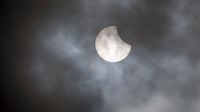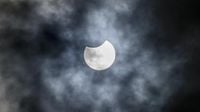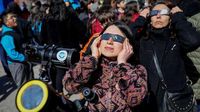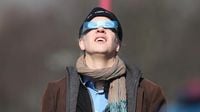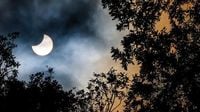On Saturday, March 29, 2025, a partial solar eclipse will captivate observers throughout Germany, as the moon partially obscures the sun. This celestial event, which hasn't been seen since the last total solar eclipse in Germany on August 11, 1999, is set to begin around noon.
During this partial eclipse, the degree of coverage will vary by location. In northern Germany, viewers can expect up to 25 percent of the sun to be obscured, while in southern regions, only about ten percent will be covered. This phenomenon occurs when the moon passes between the Earth and the sun, casting a shadow that partially blocks sunlight.
As Dr. Uli Klein from the Astronomical Association Vulkaneifel explains, "The moon orbits the Earth and takes about a month to do so. Its distance from Earth and its size allow it to obscure the sun when positioned correctly." This alignment results in a rare opportunity for stargazers to witness the moon's shadow moving across the sun.
For those eager to experience the eclipse, proper eye protection is essential. Experts recommend using solar eclipse glasses equipped with certified filters to prevent serious eye damage. Without these protective measures, looking directly at the sun can lead to severe retinal injuries.
In Munich, the eclipse will officially begin at 11:28 AM, reaching its maximum coverage of approximately ten percent at 12:11 PM and concluding at 12:55 PM. Meanwhile, in the Trier region, the event will start at 11:20 AM, with local astronomy clubs offering safe viewing opportunities through telescopes.
On the same day, March 29, 2025, is also designated as the "Tag der Astronomie" (Day of Astronomy). Various observatories and astronomy clubs across Germany will host events, providing the public with safe viewing options and expert insights. The Sternwarte Sankt Andreasberg, for instance, will offer a special program featuring live observations and talks from experts, starting at 10 AM.
In addition to the live events, many astronomy channels and research institutes will broadcast the eclipse online, allowing those who cannot attend in person to participate virtually. For example, the Astronomy Association "Pegasus Wolfenbüttel" is organizing an event that will begin at 11:26 AM and end around 1:07 PM, allowing attendees to witness the moon's gradual encroachment on the sun.
The eclipse will be visible across the entire country, with the most significant coverage occurring in the northwest. According to the House of Astronomy in Heidelberg, locations like the mouth of the Ems and Sylt will experience the highest degree of obscuration, reaching up to 23 percent.
As the event unfolds, viewers will see the sun appear as though it has been "bitten" at the edges, a striking visual effect that many will find fascinating. However, Dr. Klein emphasizes that this is not a total eclipse, which would require the moon's shadow to fall directly on the observer's location. Instead, those in the path of the partial eclipse will witness only a portion of the sun being covered.
For those interested in photographing the event, experts advise against using regular cameras or smartphones without appropriate solar filters, as the sun’s brightness can damage the equipment. Instead, specialized solar filters should be used to capture the moment safely.
As the excitement builds for this astronomical event, many are reminded of the last total solar eclipse that captivated Germany. The upcoming partial eclipse offers a unique opportunity for both seasoned astronomers and curious onlookers to engage with the cosmos.
As the date approaches, communities are preparing for gatherings and public viewings, ensuring that everyone has the chance to experience this remarkable natural phenomenon. Whether through organized events at observatories or casual viewing from home, the partial solar eclipse promises to be a highlight of the year for astronomy enthusiasts.
In summary, the partial solar eclipse on March 29, 2025, is set to be an unforgettable experience, with various events planned across Germany. With the right precautions and preparations, observers can safely enjoy this celestial spectacle and perhaps spark a lifelong interest in astronomy.
